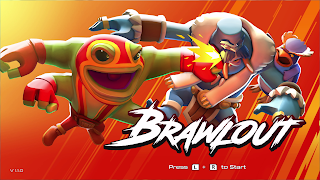Need something to scratch that Smash Bros itch?
I try to avoid making too many direct comparisons to other games in these reviews, but with so few titles in the Platform Fighter genre it’s hard not to see them in the context of the various Smash Bros games. Brawlout sticks especially close to the Smash Bros. formula, but it does differentiate itself in some key ways that give the game its own identity.
Sessions of Brawlout play out in standard platform fighter fashion: try to knock your opponent off the stage. The more damage you do to a character, the further they’ll fly when you hit them. Also like most platform fighters, Brawlout’s controls are quite simplified by fighting game standards.
Where Brawlout starts to deviate from the standard formula is there are no grabs and no blocking. Virtually all your defensive options are tied to careful use of dodges, which forces everyone to lean heavily on their offense.
Brawlout’s other standout feature is the Rage Meter, which builds as your characters take damage. Triggering a Burst will interrupt your opponents combos and gives you additional aerial recovery options.
A fighter is nothing without its cast though, and Brawlout’s is a bit of a mixed bag. There are eight core characters, including guest stars Juan from Guacamelee and the Drifter from Hyper Light Drifter. In an effort to produce more characters on a limited budget, there are ‘variants’ for most of those core characters. Variants function like Fox and Falco in Smash Bros. They’re both almost the same character, but tweaked stats and special attacks let them feel different. The variants in Brawlout are very uneven, with some feeling like completely different characters but others are having barely noticeable changes aside from their visuals.
The art and sound design is similarly mixed. Brawlout’s overall art has a nice solid blockiness to it that almost makes everything look like action figures. Many of the game’s stages are gorgeous with bright striking colors, but have unfortunate lighting and contrast problems that can make it very difficult to distinguish certain characters from their backdrops.
Oddly, characters are unvoiced aside from attack impacts which can make fights feel uncomfortably muted and lifeless. A solid soundtrack does its best to cover this, but matches still feel like there’s something missing.
Definitely one thing that really hurts Brawlout is it’s unlock systems. Outside of the core cast and a couple of stages, everything in Brawlout is locked behind random loot boxes from the start. Thankfully loot boxes are bought using in-game currencies only – there is no real money involved. Even with an update that granted extra coins and gems for achievements, it takes forever to unlock critical gameplay features and it’s a monotonous grind the whole way there.
Brawlout definitely aims for the competitive market, and there are very few game modes outside of simple versus fights. There is a single player arcade mode which offers a series of AI fights and unique endings for the entire core cast. It’s nothing special but it’ll keep those without an internet connection or local opponents busy for a little while at least.
Online matchmaking was almost completely unplayable at launch, but has since been fixed with some regional filters. It’s still not going to be perfect every time, but it’s totally serviceable and often silky smooth even here in Japan. Once you’ve finished playing, all of your games are saved in Brawlout’s Replay Channel so you can hoard your more impressive wins!
It would be very easy dismiss Brawlout as a cheap throwaway title just to hold you over until a ‘real’ platform fighter arrives on the Switch, but that is a terrible disservice to a game that is easily good enough to stand on its own. It’s a little thin on content and rough around the edges in places, but Angry Mob have shown they’re committed to updating the game with new features and characters as time goes on along. If you are in the market for a platform fighter, Brawlout could very well surprise you if you go in with an open mind.
Final Score: 7.5













No comments:
Post a Comment